 Petzlover
Petzlover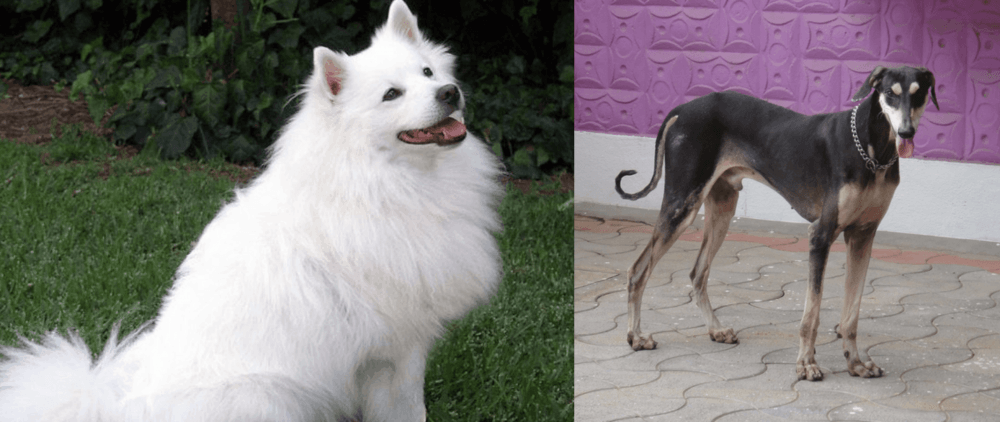 Both Indian Spitz and Kanni are originated from India. Indian Spitz may grow 42 cm / 16 inches shorter than Kanni. Indian Spitz may weigh 15 kg / 33 pounds lesser than Kanni. Both Indian Spitz and Kanni has almost same life span. Indian Spitz may have less litter size than Kanni. Indian Spitz requires Moderate Maintenance. But Kanni requires Low Maintenance
Both Indian Spitz and Kanni are originated from India. Indian Spitz may grow 42 cm / 16 inches shorter than Kanni. Indian Spitz may weigh 15 kg / 33 pounds lesser than Kanni. Both Indian Spitz and Kanni has almost same life span. Indian Spitz may have less litter size than Kanni. Indian Spitz requires Moderate Maintenance. But Kanni requires Low Maintenance
 The Indian Spitz is a working dog and has always been used for hunting and tracking small game. It is a popular dog breed in India.
The Indian Spitz is a working dog and has always been used for hunting and tracking small game. It is a popular dog breed in India.
There isn't too much information on the exact origin of the dog but dog experts tell us the dogs have descended from different Spitz breeds and wild wolves, and that they date back thousands of years.
People often mix them up with the Pomeranian, but they're different, being introduced in India by the British. The British began breeding them from a stock of German Spitz's and years of breeding produced the ideal dog type which could cope with the tempestuous weather conditions in India.
They aren't recognized by any major kennel clubs but the Kennel Club of India is working to establish the Indian Spitz as a separate breed.
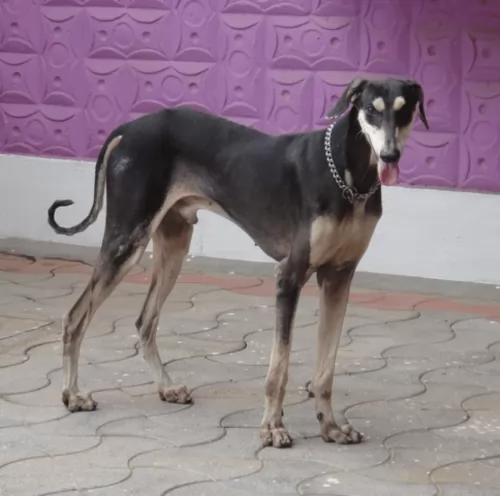 The Kanni dog is a rare South Indian Sighthound. It is also known as the Maiden's Beastmaster and this is because it is known to be protector and defender of its owner's property.
The Kanni dog is a rare South Indian Sighthound. It is also known as the Maiden's Beastmaster and this is because it is known to be protector and defender of its owner's property.
During ancient times, the dog was used for hunting but today it is essentially kept as a pet and it is registered with the Kennel Club of India.
 The Indian Spitz is an attractive, fluffy looking dog breed thought to have been domesticated thousands of years ago.
The Indian Spitz is an attractive, fluffy looking dog breed thought to have been domesticated thousands of years ago.
The dog comes in two sizes – the smaller- and larger size. The Smaller Indian Spitz stands at between 20 - 25 cm and weighs between 5 – 7kg while the Greater Indian Spitz stands at 35-45cm and weighs between 12 – 20kg.
The dog has a long-haired coat, with the hair on the head being shorter than the rest of the body. The color of the coat can be white, brown or black and white.
The Indian Spitz is an easy-going dog which adapts to all kinds of living conditions in India. They therefore adapt easily to life in the city or in the countryside.
The Indian Spitz is a social, friendly dog who is loyal towards his human family, showing his joy at being with them with high-pitched barking. He gets on well with children in the home and because he isn't aggressive, he gets on well with pets in the home too.
He is intelligent which means that he is able to be trained and socialized, turning him into an obedient pet who takes his job as guardian and protector seriously.
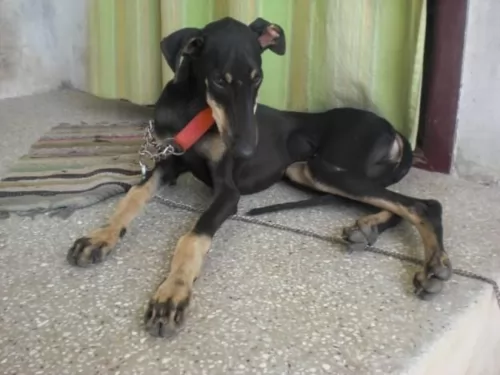 These dogs are tall, slim and deep chested, coming in two-color combinations, but it is the black and tan variety that is the true Kanni. There is also a cream variety. There are other color variations and each color has a unique name connected to it. The coat of the Kanni is short and smooth.
These dogs are tall, slim and deep chested, coming in two-color combinations, but it is the black and tan variety that is the true Kanni. There is also a cream variety. There are other color variations and each color has a unique name connected to it. The coat of the Kanni is short and smooth.
They are medium sized dogs standing at 62 to 67cm at the withers and weighing in the region of 18 – 22kg. When you first look at these dogs you might think of them as being similar to a Greyhound in looks. This is also because of their lean, muscular looks.
The eyes are a golden color, the nose black and the ears are a medium size and floppy with the long tail being semi-curved.
The Kanni has always been a hunting dog so he is used to being sharp, strong-willed, independent and alert as well as having some aggressive tendencies. It is also quite a reserved dog but he shows love and loyalty to his owner. He is independent and easy to train. It is a good thing to have him trained and socialized so that he is obedient to the simple commands you give him.
 Playful, feisty, intelligent, loving and loyal, the Indian Spitz is full of character and just loves being in a loving family home.
Playful, feisty, intelligent, loving and loyal, the Indian Spitz is full of character and just loves being in a loving family home.
Easy to train, he becomes a wonderfully obedient canine friend who loves nothing more than to spend time with you, especially when it is outdoors going for a walk or playing ball.
He is an entertaining little dog too, and anyone wishing to buy a dog like this won't regret it as he brings in a joyful dimension to any home.
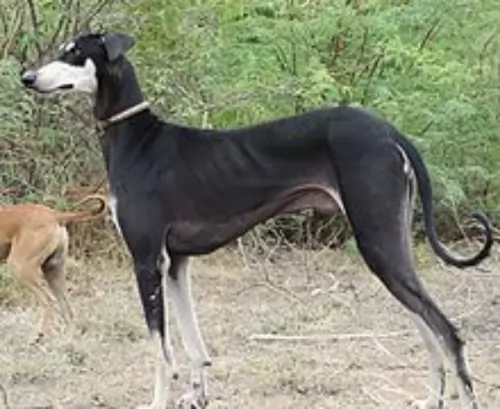 The Kanni looks much like your regular Doberman Pinscher but he has long tail and floppy ears. He is slim and agile but also powerful being able to have bursts of speed. It is why he requires a large place to run and play in, being better suited to a home with a large garden or farm.
The Kanni looks much like your regular Doberman Pinscher but he has long tail and floppy ears. He is slim and agile but also powerful being able to have bursts of speed. It is why he requires a large place to run and play in, being better suited to a home with a large garden or farm.
He is a playful, quiet dog but he has quite a bark on him and is known to be a good watchdog because of this. He is a protective dog too, devoted and loyal and making a splendid family pet.
 These feisty little dogs can reach 14 years of age if looked after well.
These feisty little dogs can reach 14 years of age if looked after well.
Your Indian Spitz will need to see a vet when he is 6 weeks of age for his first vaccinations and also whenever he is sick.
He is a dog breed that doesn't get sick very easily, but still it is wise to know about some of the more common dog diseases that could plague your little pet, and these are among others, hip dysplasia, epilepsy, cancer and vision- and dental problems.
It is important to be keeping an eye on your dog's oral health. Infected teeth can have a bad impact on his health and can actually contribute to heart- and kidney disease for instance.
One of the major causes of dental disease in dogs is none other than diet. Always try to feed your pet the best quality food there is. Certainly if you feel your pet isn't getting the best food, try a probiotic supplement as this can create a healthy bacterial environment in your dog’s mouth.
Check your pet's mouth regularly so you can attend to any dental problem before it gets out of hand.
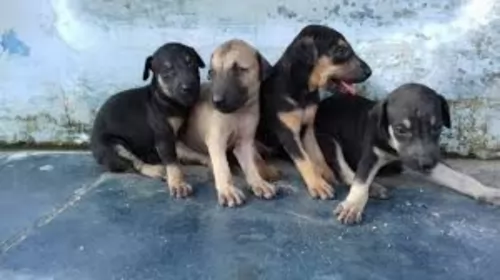 Not much is known about inherited health problems in this breed, and he can live up to a ripe old age of 16. It seems a pretty healthy dog, but still it helps to be aware of some of the more common dog illnesses that your pet can succumb to.
Not much is known about inherited health problems in this breed, and he can live up to a ripe old age of 16. It seems a pretty healthy dog, but still it helps to be aware of some of the more common dog illnesses that your pet can succumb to.
For first time dog owners it can be difficult knowing what health problems our beloved pets could suffer from. Every dog breed has certain diseases to which they are more prone to, but these are some common issues that most of our 4-legged friends will face -
This is a common dog health problem in India with the Kanni. There are so many things that disagree with their digestion. Most dogs may not want to eat their next meal, but when he is lethargic, he is hot and is vomiting, it is time to get your pet to the vet. This is because diarrhea causes rapid dehydration in dogs. To avoid diarrhea, steer clear of certain foods such as milk and dairy products as well as old, spoiled fatty foods. With diarrhea your dog must always have access to fresh, cool water.
This is a common dog disease, and ear infections can be painful and frustrating for your pet. He’ll scratch at his ear, shake his head and the inside of the ear may be red with a discharge. Check his ears for redness and try to keep them free from wax build up and dust.
Cleaning the ear is quite simple, and if you’re not sure how, the vet can do it quickly and effectively. Usually some dog ear cleaning solution on some cotton wool can do the trick. Ear infections are common in dogs like the Kanni with floppy ears.
It is essential to control fleas on your dog from word go. Fleas thrive in warm temperature and humidity and your pet will scratch, bite and lick at the spot. When you brush your pet, look through his fur for fleas and tell you vet about it if you discover ticks and fleas. A topical ointment could nip the problem in the bud. You may want to consider a flea collar for your pet.
Tapeworms, hookworms and roundworms for instance are commonly found in dogs, and even for healthy dogs, deworming tablets should be given from time to time. If your dog has worms, you’ll notice lethargy, loss of appetite, diarrhea and vomiting. It may be time to get your pet to the vet.
 These dogs have been used to a diet of milk and rice, but if possible it can be beneficial to the dog to include some cooked chicken and vegetables too. Raw meat is also important, but it is expensive, so just adding it in from time to time can still be beneficial. Water which is cool and clean should be available to the dog day and night, non-stop.
These dogs have been used to a diet of milk and rice, but if possible it can be beneficial to the dog to include some cooked chicken and vegetables too. Raw meat is also important, but it is expensive, so just adding it in from time to time can still be beneficial. Water which is cool and clean should be available to the dog day and night, non-stop.
Your Spitz dog will simply require a brush twice a week to keep it clean and vibrant and free from loose hairs. While brushing him, make a point of checking him for fleas and ticks as well.
This is a busy little dog that wants to involved in everything you're busy with. He will love to join you in your long walks each day or if you take him to the park, he will love the chance to run off his leash.
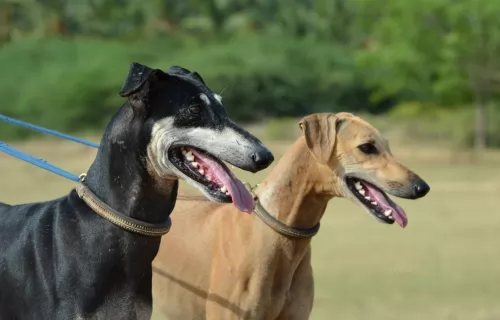 The Kanni is a low maintenance dog with his short coat. You can give him a good brush twice a week, check that his nails don't grow too long and also check his ears inside and out. Ticks and fleas are rife in hot weather and you want to give your dog a thorough check for these. You should also be checking your dog's teeth and brushing them 2 or 3 times a week. Dental problems can cause havoc with your dog's health.
The Kanni is a low maintenance dog with his short coat. You can give him a good brush twice a week, check that his nails don't grow too long and also check his ears inside and out. Ticks and fleas are rife in hot weather and you want to give your dog a thorough check for these. You should also be checking your dog's teeth and brushing them 2 or 3 times a week. Dental problems can cause havoc with your dog's health.
As a hunting breed, the Kanni is used to running so his needs for a good amount of exercise are quite high. While they do make good family pets, they hanker after wide open spaces and being busy. If you own one of these dogs, make sure that you exercise him often because otherwise he becomes frustrated and unhappy.
This dog has always been used to village life where he is free to roam wide open spaces. He is much more suited to country life than to city life, and as a pet, you will need to ensure that he receives a good amount of exercise.
Take him for walks, and if he's been socialized and trained, take him to the park and allow him off his leash to run.
The dog has always been fed traditional food such as porridge and milk but we know better now that dogs need protein too as well as a diet rich in vitamins and minerals to ensure his health.
You can feed him a top quality commercially manufactured dog food and add in some cooked chicken, rice and vegetables from time to time. It is expensive, but if you can, try and add in some raw meat occasionally as well. Your Kanni dog must always have access to fresh, clean water.